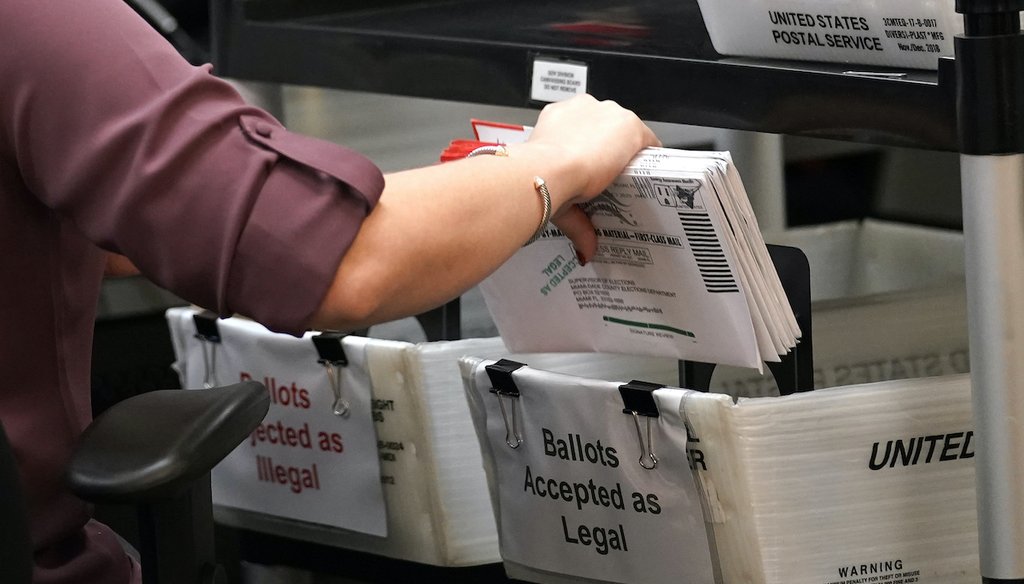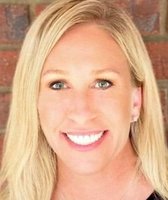Stand up for the facts!
Our only agenda is to publish the truth so you can be an informed participant in democracy.
We need your help.
I would like to contribute

In this Oct. 26, 2020, file photo an election worker sorts vote-by-mail ballots at the Miami-Dade County Board of Elections in Doral, Fla. (AP)
If Your Time is short
-
Floridians in 2018 voted to amend the state’s constitution and allow certain felons to regain their right to vote after leaving prison.
-
Florida Gov. Ron DeSantis’ administration said this year that about 20 felons who were out of prison have been charged with false affirmation in voting or elections and voting as an unqualified elector in the 2020 election.
-
Some felons say they didn’t know they were ineligible to vote. DeSantis has suggested that county officials didn’t do their jobs and allowed felons to vote. Voting rights advocates say it’s state officials who are failing to verify eligibility.
After much debate in 2018, Floridians decided to amend the state’s constitution so certain felons — once out of prison — could regain the right to vote. Floridians were persuaded that felons who did not commit major crimes, such as murder or sexual assault, should have a say in issues that affect everyday life.
Four years later, some felons are finding themselves facing charges again. This time, for voting.
About 20 people have been charged with false affirmation in voting or elections and voting as an unqualified elector in the 2020 election. These are third-degree felonies, and convictions can lead to five years in a Florida prison. So far, 19 of the 20 have been arrested.
Some of the people arrested say they thought they could register to vote and participate in elections. "I don’t really understand, how did I commit fraud?" Leo Grant Jr., a 55-year-old Palm Beach County resident told the Miami Herald/Tampa Bay Times. "I don’t understand any of this stuff."
Florida Gov. Ron DeSantis has suggested that local county officials are at fault, arguing that it’s their responsibility "to ensure that those voting roles are accurate."
"Some local jurisdictions, they just don’t care about election laws," DeSantis said Aug. 30.
Meanwhile, voting rights advocates say state officials are the ones who are in the wrong.
"At the end of the day it's the state’s responsibility to determine voter eligibility for our statewide system," said Neil Volz, deputy director of the Florida Rights Restoration Coalition.
What’s going on in Florida?
For decades, the process for felons to regain their voting rights was a long shot, but it was clear. The Clemency Board, a group of statewide officials, held the power to restore rights to felons. The process often required felons to attend a hearing in Tallahassee, the state capital, and ask to have their rights restored.
All of that changed in 2018, when 65% of voters agreed to amend the state constitution to restore voting rights to most felons who had completed their sentences.
Amendment 4 did not apply to felons who committed murders or felony sexual assault. (Felons not covered by the amendment can still seek review by the Clemency Board.)
For years, debate over what it meant to complete a sentence bogged down the amendment’s implementation. In 2019, the Republican-led Legislature passed a law requiring that felons first pay off their fines and related court fees. A court upheld that legislation shortly before the 2020 election.
Here is the problem: The state has no easy way for felons to discern whether they still owe money, sometimes from cases decades ago. And the voter registration form doesn’t say that those with murder or felony sex convictions are ineligible to automatically regain their voting rights.
A page on the state’s elections’ website says felons can ask for an advisory opinion from the Florida Division of Elections if they are uncertain of their rights. But that option is not mentioned on the voter registration page.
"The state is not adequately informing people of what the rules are," said Nick Warren, an attorney at the American Civil Liberties Union of Florida. "It’s not right to set up this impossible to follow system and then trap people on the back end and threaten them with criminal charges."
Some counties including Broward, Orange and Palm Beach have posted some information about eligibility rules.
When Floridians register to vote, they check a box that says, "I affirm I am not a convicted felon, or if I am, my right to vote has been restored."
State law clearly spells out that it’s the state’s job to verify voter eligibility for all Floridians, including felons. Florida statute 98.075 says the Florida Department of State "shall protect the integrity of the electoral process by ensuring the maintenance of accurate and current voter registration records."
The law says the state shall examine state and federal law enforcement and court records to identify registered voters who have been convicted of a felony and whose voting rights have not been restored.
It’s unclear how long it takes the state to complete that process. A state official testified in 2020 that a voter registration application is cross-checked with state law enforcement data within 24 hours. But a 2021 state document about vetting felon records to determine voter eligibility mentions no required timeframe.
When the state finds credible information about an ineligible voter, it forwards that information to the county elections supervisor. It’s up to the county officials to remove the voter.
County officials must notify the voters and allow them to submit documentation to prove their eligibility.
County election supervisors told PolitiFact that although it is the state’s responsibility to flag people who are ineligible to register, they can flag voters on their own if they receive a credible tip.
In the recent arrests of people with felony records, the state often didn’t notify the county election supervisors for one to two years after the individuals registered to vote.
For example, in Palm Beach County, the three arrested people registered to vote from February 2019 to April 2020. The state notified the county of their ineligibility in early 2022.
The state acknowledged that county officials were not at fault for the registrations of the people with felony records.
The new Florida law created an office to investigate election crimes in Florida.
Democrats and voting rights advocates question why the state needs the new Office of Election Crimes and Security, given that DeSantis has praised the efficiency of Florida’s 2020 election.
It’s unknown whether the charges will lead to convictions for the people who registered to vote even though they had felony murder and sexual assault convictions. The defendants have said they thought they had the right to vote, especially since officials allowed them to register.
The two statutes the 20 people were charged under say guilt hinges on "willfully" providing false information or "knowing" they are not qualified to vote.
State Sen. Jeff Brandes, R-St. Petersburg, a sponsor of the law that implemented Amendment 4, tweeted that he thinks the defendants did not know they were ineligible.
Denying certain felons the right to vote traces back to the post-Civil War era. The 1870 ratification of the 15th Amendment guaranteed men the right to vote regardless of race. (Women weren’t allowed to vote until 1920.) But after its ratification, a wave of states enacted laws or amendments to take away prisoners’ right to vote.
One in 16 African Americans of voting age is disenfranchised because of a felony conviction, a rate 3.7 times greater than that of non-African Americans, according to the Sentencing Project, a criminal justice advocacy group.
President Joe Biden campaigned on a promise to give states incentives to allow felons to regain the right to vote, but his efforts have stalled amid Republican opposition in the Senate.
The trend over the past decade has been toward making it easier for individuals to regain their voting rights when they leave prison. Supporters of restoring voting rights say that allowing ex-prisoners to vote is part of reintegrating them into society. Opponents say those who break the law should not easily regain their right to vote.
In Maine, Vermont and Washington, D.C., felons don’t lose their right to vote.
In some states, felons regain their voting rights when they leave prison. In other states, they must wait for a certain amount of time or complete steps such as probation or parole before regaining their right to vote.
We interviewed election officials in Alabama, a state along with Florida that is stricter about felon voting restoration, to ask how they vet people with felony records.
In Alabama, the county Board of Registrars verifies applicants have not committed a crime of "moral turpitude," which refers to a long list of crimes including violent offenses. If applicants have been convicted of such a crime and completed their sentences, they must provide a certificate of eligibility issued by the Board of Pardons and Paroles before they can register to vote.
Barry Stephenson, chair of the Jefferson County Board of Registrars, told PolitiFact that election officials can access information from the Alabama Office of the Courts and the federal court system to vet voters.
"We do it on the front end because a decent amount of time the person has already served time and have been granted their serve papers by the pardon and parole board — they just have to provide them to us," he said. "We walk them through that process."
In Florida, it would benefit everyone if state officials could vet eligibility on the front end, said Volz, the advocate for restoring felons’ voting rights. (Volz, who was convicted of felony fraud in 2006 while working as a lobbyist, regained his voting rights in 2020.)
Said Volz, "It's the old adage: The best way to fight crime is to stop it in the first place."
RELATED: Biden’s promise related to restoring felons’ voting rights stalls
RELATED: Fact-checking Louisiana Democrat’s claim about Black Americans and the right to vote
RELATED: All of our fact-checks about Florida
Our Sources
Florida Department of State, Florida online voter registration system, Accessed Aug. 24, 2022
Florida statutes, Chapter 97 Qualification and registration of electors, Accessed Aug. 24, 2022
Florida SB 524, Bill analysis and fiscal impact statement, Feb/ 28, 2022
Gov. Ron DeSantis, Press release, Aug. 21, 2019
Peter Antonacci, Office of Election Crimes and Security, Letter to Palm Beach Supervisor of Electionss, Aug. 18, 2022
Florida Channel, Press Availability with Secretary of State Cord Byrd, Sept. 1, 2022
Gov. Ron DeSantis, Facebook live press conference, Aug. 30, 2022
Broward Supervisor of Elections, Learn about Amendment 4, Accessed Aug. 24, 2022
Orange County Supervisor of Elections, Former Felons (2018 Amendment 4), Sept. 11, 2020
Palm Beach County, Amendment 4 FAQs, Accessed Aug. 24, 2022
Florida Channel (courtesy WPLG), Governor’s Press Conference on Election Integrity, Aug. 18, 2022
The Guardian, Floridians charged over voting believed they were eligible, documents show, Aug. 25, 2022
U.S. District Court Northern District of Florida, Transcript in Jones v DeSantis (uploaded by The Guardian), May 4, 2020
Politico, Defendants targeted in DeSantis’ voter fraud crackdown were told they could vote, Aug. 26, 2022
Tampa Bay Times, Florida arrested felons for election fraud. It also gave them voter IDs. Aug. 31, 2022
Tampa Bay Times, DeSantis touted their arrest. But ex-felons say they weren’t told they couldn’t vote. Aug. 19, 2022
Tampa Bay TImes, DeSantis announces 20 voter fraud arrests of Floridians, calls it an ‘opening salvo’ Aug. 18, 2022
PolitiFact, Rick Scott says Charlie Crist favors violent felons immediately getting their right to vote restored, Oct. 27, 2014
PolitiFact, Do states verify citizenship of voters in federal elections?, Dec. 7, 2020
Email interview, Suzy Trutie, Miami Dade Deputy Supervisor of Elections, Aug. 19, 2022
Email interview, Danae Rivera-Marasco, Orange County Supervisor of Elections spokesperson, Aug. 23, 2022
Email interview, Gerri Kramer, Hillsborough County Supervisor of Elections spokesperson, Aug. 19, 2022
Email interview, Alison Novoa, Palm Beach County Supervisor of Elections spokesperson, Aug. 30, 2022
Telephone interview, Ivan Castro, Broward Supervisor of Elections spokesperson, Aug. 24, 2022
Email interview, Mard Ard, Department of State spokesperson, Aug. 23, 2022
Telephone interview, Mark Earley, Leon County supervisor of elections and president of the Florida Supervisors of Elections, Aug. 23, 2022
Telephone interview, Nick Warren, ACLU of Florida attorney, Aug. 23, 2022
Telephone interview, Neil Volz, deputy director of the Florida Rights Restoration Coalition, Aug. 29, 2022
Email interview, Shane Hamlin, spokesperson for the Electronic Registration Information Center, Aug. 22, 2022
Telephone interview, Barry Stephenson, chair of the Jefferson County Board of Registrars, Aug. 30, 2022
Email interview, Cameron Mixon, Alabama Secretary of State spokesperson, Aug. 29, 2022
Email interview, Patrick Gannon, North Carolina State Board of Elections spokesperson, Aug. 30, 2022
Email interview, Bryan Griffin, Gov. Ron DeSantis press spokesperson, Sept. 1, 2022






































